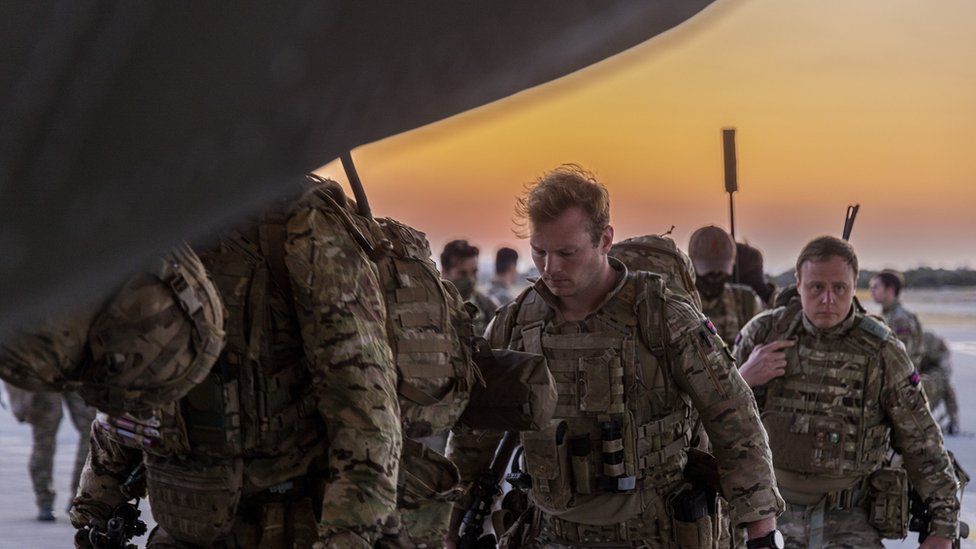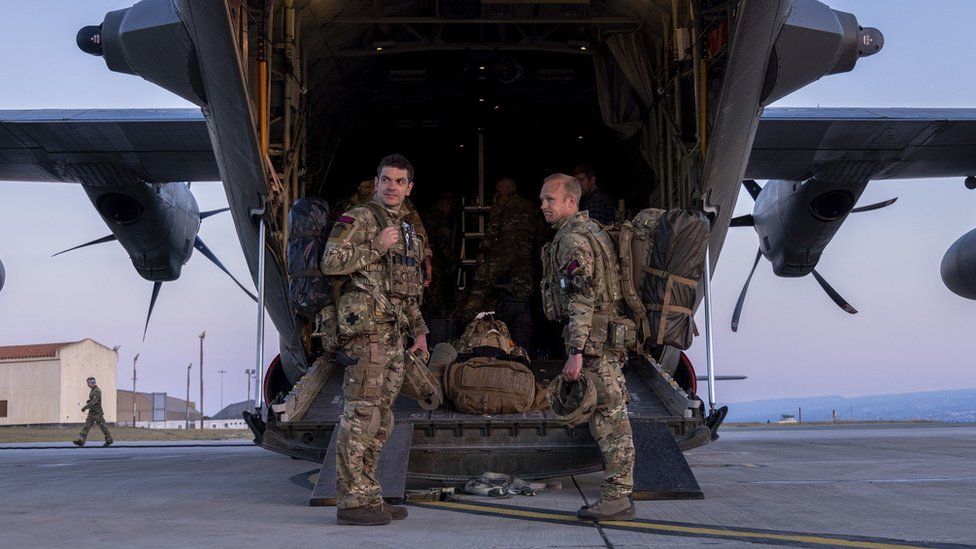
The UK's first evacuation flight carrying British nationals has left Sudan, Downing Street has confirmed.
At least two more flights are expected overnight, as the military attempts to get hundreds out of the war-torn country during a 72-hour ceasefire.
Families with children, the elderly and people with medical conditions will be prioritised on RAF flights leaving from an airfield near the capital Khartoum.
They are being told to make their own way to the airport, without an escort.
No 10 said the situation was "fast-moving" but the first flight was expected to arrive in Cyprus later, before people are transported back to the UK.
At least 459 people have been killed since fighting broke out on 15 April.
A temporary pause in fighting between rival military factions appears to be holding, although there have been reports of new gunfire and shelling, and previous agreements have broken down.
UK ministers have come under increasing pressure to help its citizens flee the fierce fighting.
Around 4,000 UK nationals are thought to be in Sudan and 2,000 of them have already requested help, Foreign Office minister Andrew Mitchell said on Monday, but the number who come forward for evacuation is expected to be lower.
Estimates of how many people will be on the flights provided by sources involved in the operation have varied, with 500 suggested to the BBC on Tuesday.
Only British passport holders and their immediate family with existing UK entry clearance are eligible, the government has said.
The Foreign Office initially said people should not travel to the evacuation site until told to do so - but updated its advice on Tuesday afternoon urging people to make their own way to the Wadi Saeedna airfield to the north of Khartoum "as soon as possible".
The advice published online warned evacuees that "travel within Sudan is conducted at your own risk and plans may change depending on the security situation".
Germany, which has been running operations at airfield, is due to end its evacuation later on Tuesday after airlifting around 500 people.
UK defence secretary Ben Wallace told a Commons committee earlier on Tuesday that 120 British troops were involved and "stand prepared to take over" from the Germans when they leave the site.
He also confirmed that Royal Marines are continuing to prepare an alternative route out of Sudan via a port on the east coast, as well as making contingencies for any humanitarian response.
The BBC understands the military is working on the assumption they have a 24-hour window in which to get planes in and out of Sudan, a window Prime Minister Rishi Sunak described as "absolutely critical".
Addressing Foreign Office staff working on the evacuation, he said a "big push" was needed to "get everyone who wants to come home home".
Foreign Secretary James Cleverly said the government was not able to escort people to the airfield and British nationals would need to "make their own way there".
Later on Tuesday, he said the situation remained "dangerous, volatile and unpredictable", and that the viability of the operation depended on those involved in the fighting.
One man with dual nationality said he feared he might not make it out of Sudan.
Musaab, who is waiting to be evacuated from Khartoum, told the BBC the situation was fraught with challenges.
"The one thing that I didn't like is that they're asking people to come to the airport - which is very risky because there is no law and order," he said.
This video can not be played
To play this video you need to enable JavaScript in your browser.
Many British nationals have spent days indoors with food and drink running low and no electricity or wifi.
Several have spoken of their anger and desperation at being left behind, while other foreign nationals and UK embassy staff were flown out.
Sir Nicholas Kay, a former UK ambassador to Sudan, said the situation in Khartoum was precarious and the security situation could change rapidly because there was no trust between the two sides in the conflict.
He told BBC Radio 4's Today programme that moving around Khartoum could be challenging because the bridges crossing the Blue and White Nile rivers were being controlled by armed groups.
Hundreds of people have been airlifted from Sudan by other countries, including more than 1,000 people by European Union nations.

Dr Nala Hamza, whose family is trying to get out of Khartoum, said the evacuation was "good news if it came to reality".
She said her family, who live in the centre of the city, had fled their home at dawn to try to get a bus to the north of the country.
"They were hiding in a room at the back of the house away from windows because of the shooting," she told BBC Breakfast.
Dr Hamza said at least 40 out of 55 hospitals were "not functioning at all" and the system "was already struggling before the war".
There was no safe route to get any help and doctors were exhausted, she added.
Dr Atia Abdalla Atia, the general secretary of the Sudan Doctors Union, agreed the situation was "very bad" and they were doing their best to support people.
He told BBC's Today the hospital he was working in has reached maximum capacity and patients were lying down in reception without beds.
Mo, from Reading, said he was "very scared" for his family, who had arrived in Khartoum the day before the violence broke out.
"They were in that area for the first five days, with no electricity, water running out, they were isolated," he said.
"Even getting to this airport that's being looked at to be evacuating Brits from, that in itself is going to be hard to get to."

Are you a British citizen in Sudan? Please share your experiences if it is safe to do so by emailing haveyoursay@bbc.co.uk.
Please include a contact number if you are willing to speak to a BBC journalist. You can also get in touch in the following ways:
- WhatsApp: +44 7756 165803
- Tweet: @BBC_HaveYourSay
- Upload pictures or video
- Please read our terms & conditions and privacy policy
If you are reading this page and can't see the form you will need to visit the mobile version of the BBC website to submit your question or comment or you can email us at HaveYourSay@bbc.co.uk. Please include your name, age and location with any submission.
Related Topics
https://news.google.com/rss/articles/CBMiJGh0dHBzOi8vd3d3LmJiYy5jb20vbmV3cy91ay02NTM4MzQwMNIBKGh0dHBzOi8vd3d3LmJiYy5jb20vbmV3cy91ay02NTM4MzQwMC5hbXA?oc=5
2023-04-25 15:36:06Z
1965440032
Tidak ada komentar:
Posting Komentar